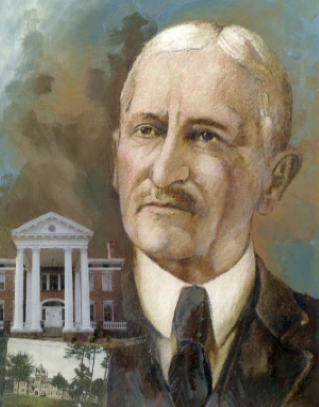
James Williams Hines served on the East Carolina board of trustees from 1915 until 1921. Although a supporter of new educational initiatives in eastern North Carolina, Hines’ time, energy, and generosity were more directed toward a nearby rival, Atlantic Christian College in Wilson (founded 1902; later, Barton College). Nevertheless, Hines’ service on the ECTTS board reflected the State Board of Education’s preference for New South businessmen devoted to shaping innovative foundations for the state, much as ECTTS was doing in higher education. Successful businessmen and industrialists like Hines proved to be, in general, among the state’s most enthusiastic and generous supporters of educational uplift.
A native of Pitt County, Hines was raised in nearby Wilson and received his early education under the instruction of a Disciples of Christ (aka, Christian Church) teacher. In the 1880s, Hines moved to Rocky Mount where he became a leader in the business development of the small town, financing early on its entry into tobacco drying, processing, and warehousing. He was also instrumental in having Atlantic Coast Line locomotive repair shops located in Rocky Mount.
Hines’ fortune was made in the manufacture and sale of ice for Atlantic Coast Line trains carrying fruit and produce from Florida to New York. His Rocky Mount Ice and Fuel Company additionally contracted with rail lines statewide to provide ice for refrigerated cars through branch operations in Salisbury, Spencer, Greenville, Weldon, Albermarle, and Monroe. Hines was also a leading figure in the Rocky Mount Chamber of Commerce.
A devoted supporter of Atlantic Christian College, Hines served on the school’s board from its founding by the Disciples of Christ in 1902 until his passing in 1928. In the early 1920s, the college, well-positioned for expansion, initiated a “crusade” to raise an endowment of $300,000. Hines, an active member of the church, pledged $100,000, contingent on the crusade raising, by 1930, an additional $200,000. Josephus Daniels, a Wilson schoolmate of Hines, called the pledge “one of the greatest gifts yet tendered to education in North Carolina.” The crusade was successful and Hines’ pledge, paid in full. In 1928, even before the crusade ended, a memorial service was held for Hines in the college chapel. Later, a prominent building on the campus, the J. W. Hines Hall Classroom Building, was named in his honor.
Hines is also known for his architectural legacy in Rocky Mount: a stately Neoclassical Revival style mansion, MacHaven, aka, the Hines’ House, completed in 1908. MacHaven is listed on the National Register of Historic Places.
Sources:
- “J. W. Hines Agrees to Lead Campaign.” News and Observer. October 3, 1924. P. 4.
- “J. W. Hines’ Funeral This Afternoon at 3.” News and Observer. February 15, 1928. P. 2.
- “James W. Hines Taken by Death: Well Known Business Man from Rocky Mount Succumbs in Richmond.” News and Observer. February 14, 1928. P. 2.
- “James Williams Hines.” Twin County Museum and Hall of Fame. https://tchof.org/james-williams-hines/
- “MacHaven.” http://oldrockymount.pbworks.com/w/page/12813594/Machaven
- “Memorial Service Held for J. W. Hines.” News and Observer. March 7, 1928. P. 2.
- “Raise Funds for Wilson College.” News and Observer. November 17, 1928. P. 2.
- Survey and Planning Unit Staff. “MacHaven.” National Register of Historic Places – Nomination and Inventory. North Carolina State Historic Preservation Office. https://files.nc.gov/ncdcr/nr/NS0010.pdf
- Ware, Charles Crossfield. A History of Atlantic Christian College: Culture in Coastal Carolina. Wilson, N.C.: Atlantic Christian College, 1956. https://digital.lib.ecu.edu/16871
Additional Related Material

James Williams Hines. Image Source: News & Observer, February 14, 1928, p. 2.
Citation Information
Author: John A. Tucker, PhD
Date of Publication: 9/22/2022